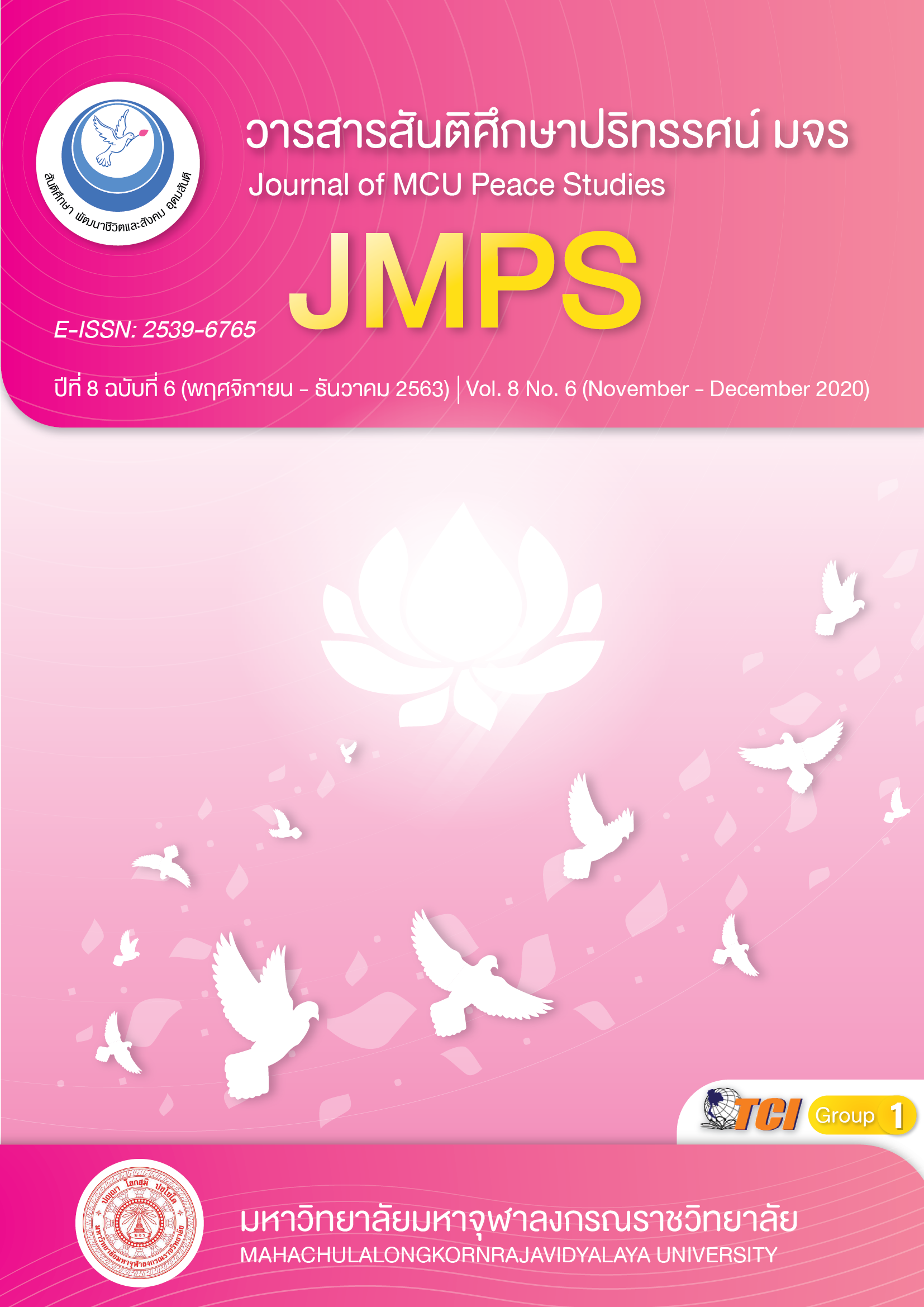การพัฒนาคุณลักษณะ ตัวบ่งชี้ และแบบประเมินคุณธรรมอัตลักษณ์สำหรับนักเรียน ในสังกัดองค์การบริหารส่วนจังหวัดนนทบุรี
Main Article Content
บทคัดย่อ
บทความวิจัยนี้ มีวัตถุประสงค์ 1) เพื่อพัฒนาคุณลักษณะ และตัวบ่งชี้คุณธรรมอัตลักษณ์ของนักเรียนในสังกัดองค์การบริหารส่วนจังหวัดนนทบุรี 2) เพื่อพัฒนาแบบประเมินคุณธรรมอัตลักษณ์ของนักเรียนในสังกัดองค์การบริหารส่วนจังหวัดนนทบุรี 3) เพื่อทดลองใช้แบบประเมินเพื่อตรวจสอบความตรงเชิงโครงสร้างของคุณลักษณะ ตัวบ่งชี้คุณธรรมอัตลักษณ์ และ 4) เพื่อศึกษาระดับความมีคุณธรรมของนักเรียนในสังกัดองค์การบริหารส่วนจังหวัดนนทบุรี กลุ่มตัวอย่างคือ นักเรียนระดับชั้นประถมศึกษาปีที่ 1 ถึงมัธยมศึกษาปีที่ 6 ของโรงเรียนในสังกัดองค์การบริหารส่วนจังหวัดนนทบุรี จำนวน 5,944 คน ได้มาโดยการสุ่มตัวอย่างแบบชั้นภูมิ เครื่องมือที่ใช้ในการวิจัยเป็นแบบประเมินแบบมาตรวัดประเมินค่า 4 ระดับ วิเคราะห์ข้อมูลโดยการหาค่าเฉลี่ย ร้อยละ และการวิเคราะห์องค์ประกอบเชิงยืนยัน ผลการวิจัยพบว่า 1) คุณลักษณะและตัวบ่งชี้คุณธรรมอัตลักษณ์ของนักเรียนในสังกัดองค์การบริหารส่วนจังหวัดนนทบุรี ประกอบด้วย 3 คุณลักษณะ 19 ตัวบ่งชี้ ได้แก่ ด้านความซื่อสัตย์ มี 6 ตัวบ่งชี้ ด้านความรับผิดชอบ มี 7 ตัวบ่งชี้ และด้านความมีจิตอาสา มี 6 ตัวบ่งชี้ ซึ่งทุกตัวบ่งชี้มีความเป็นไปได้ในทางปฏิบัติ 2) ผลการพัฒนาแบบประเมินคุณธรรมอัตลักษณ์ของนักเรียน ได้แบบประเมินที่มีลักษณะแสดงถึงระดับพฤติกรรมที่แสดงออก 4 ระดับ มีค่าสัมประสิทธิ์ความเที่ยงระหว่างผู้ประเมินเท่ากับ .984 3) ผลการวิเคราะห์องค์ประกอบเชิงยืนยัน พบว่า โมเดลมีความสอดคล้องกับข้อมูลเชิงประจักษ์ (Chi-Square = 25.09, df = 18, p = .12, GFI=.999, AGFI=.996, RMR=.000, RMSEA=.008) 4) ผลการประเมินระดับคุณธรรมอัตลักษณ์ของนักเรียน พบว่า นักเรียนมีคุณธรรมอัตลักษณ์อยู่ในระดับมาก มีผลการประเมินสูงสุดคือด้านความมีจิตอาสา ความซื่อสัตย์ และความรับผิดชอบ ตามลำดับ
Article Details
ทัศนะและความคิดเห็นที่ปรากฏในบทความในวารสาร ถือเป็นความรับผิดชอบของผู้เขียนบทความนั้น และไม่ถือเป็นทัศนะและความรับผิดชอบของกองบรรณาธิการ ยินยอมว่าบทความเป็นลิขสิทธิ์ของวารสาร
เอกสารอ้างอิง
Child and Adolescent Mental Health Rajanagarindra Institute. (2013). Guidelines to help care for teenagers with violent behavior for health personnel. Bangkok: Deenadoo Media Plus.
Chumsai Na Ayutthaya, A. (2010). moral first the knowledge. (1st ed.). Bangkok: Freemind.
Department of Local Administration. (2018). Strategy of the Department of Local Administration (2017-2026). Retrieved January 3, 2019, from http//www.dla.go.th
Division of Education Religion and Culture Promotion References. (2018). 4-years education development plan (2018-2022). Nonthaburi Provincial Administration Organization.
Kajornsin, B. (1990). Educational Research Methodology. (2nd ed.). Bangkok: physics center.
McMullen, C.M. (1985). Effective Discipline and Contingency Management System in an Urban Junior High/Middle School with and Emphasis on Development Needs to Young Adolescent. Dissertation Abstracts International, 46(7) ,616-A.
Ministry of Education. (2003). National Education Act B.E. 2542 (1999) and amendments B.E. 2545 (2002). Bangkok: Ro So Pho Printing House.
______. (2008). Indicators and core content Social studies, religion and culture subject group according to the core curriculum of basic education, 2008. Bangkok: The Agricultural Cooperative Federation of Thailand, Ltd.
______. (2009). 8 Basic Morals. Retrieved January 15, 2019, from http://www.moe.go.th/index.php/infographics/51267.
______. (2010). Development guidelines Measurement and Evaluation of Desirable Characteristics in the Basic Education Curriculum 2008. Bangkok: The Agricultural Cooperative Federation of Thailand, Ltd.
______. (2017). The 12th Educational Development Plan of the Ministry of Education (2017-2021). Bangkok: Bureau of Policy and Strategy office of Permanent Secretary.
National Ethics Promotion Board. (2016). National Moral Promotion Plan No. 1 (2016-2021). Bangkok: Ministry of Culture.
Niranthawee, S. (2005). Report on the results of learning management documents to develop learners to be good citizens. Bangkok: Office of the Education Council.
Office of the Basic Education Commission. (2010) . Learning management guidelines based on the basic education core curriculum 2008. (2nd ed.). Bangkok: The Agricultural Cooperative Federation of Thailand, Ltd.
Office of the National Education Commission. (2008). Basic Core Course 2008. Bangkok: Atthaphon Printing House.
Office of the National Economic and Social Development Board. (2016). The 12th National Economic and Social Development Plan (2017-2021). Retrieved February 23, 2019, from https://www.nesdc.go.th/ewt_w3c/main.php?filename=develop_issue.
Office of the Permanent Secretary for Education. (2017). A study of morals and ethics of learners in educational institutions under the Ministry of Education. Retrieved February 23, 2019, from https://www.bps.moe.go.th/research/fulltext/MoralityandEthics.pdf.
Rochanahasdin, S. (2017). Significant Principles of Educational Management for Citizenship. Academic Service Journal, Prince of Songkla University, 28(1), 207-217.
Rodsuti, M. (2008). What is a volunteer?. Retrieved February 6, 2019, from http://www.vachiraphuket.go.th/www/volunteer/?name=knowledge&file=readknowledge&id=4.
Srihaaumphai, P. (2007). The basic of Educational and Ethical. (4th ed.). Bangkok: Chulalongkorn University Printing House.


